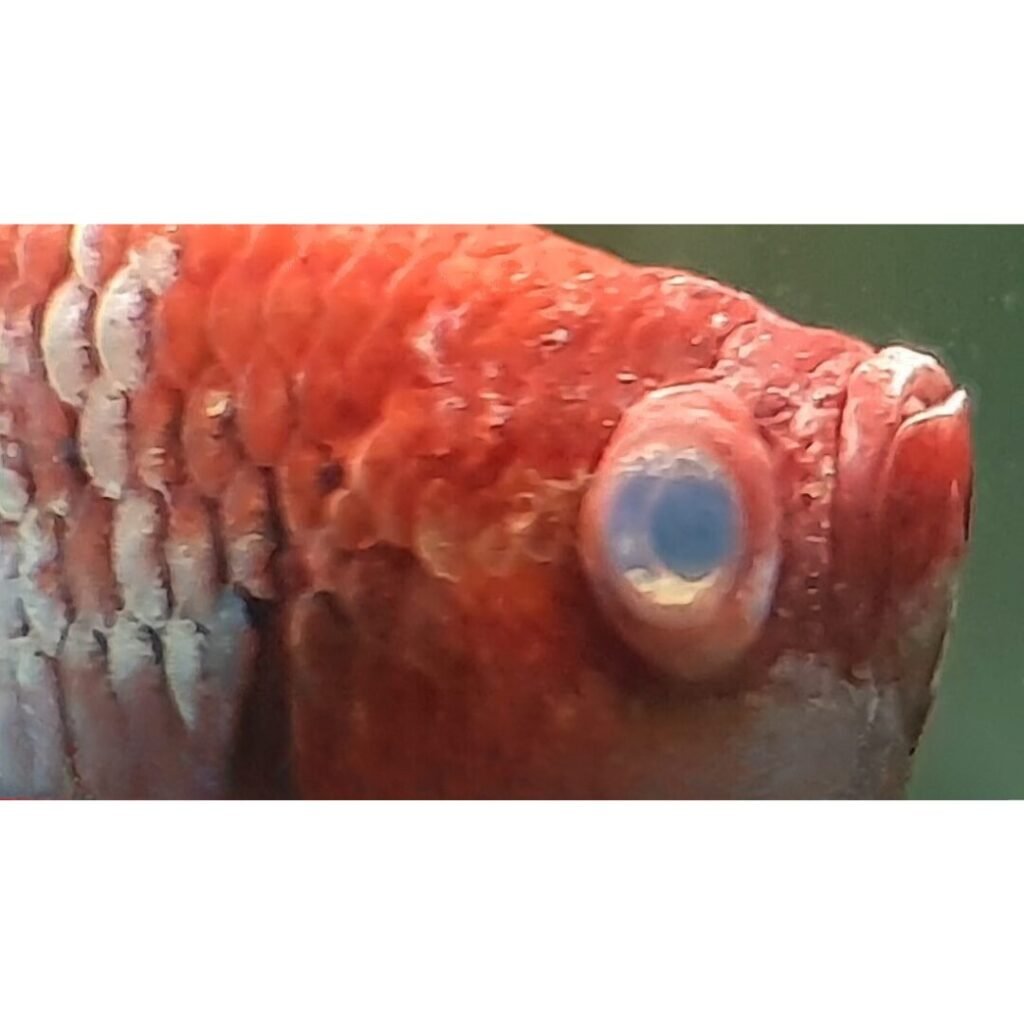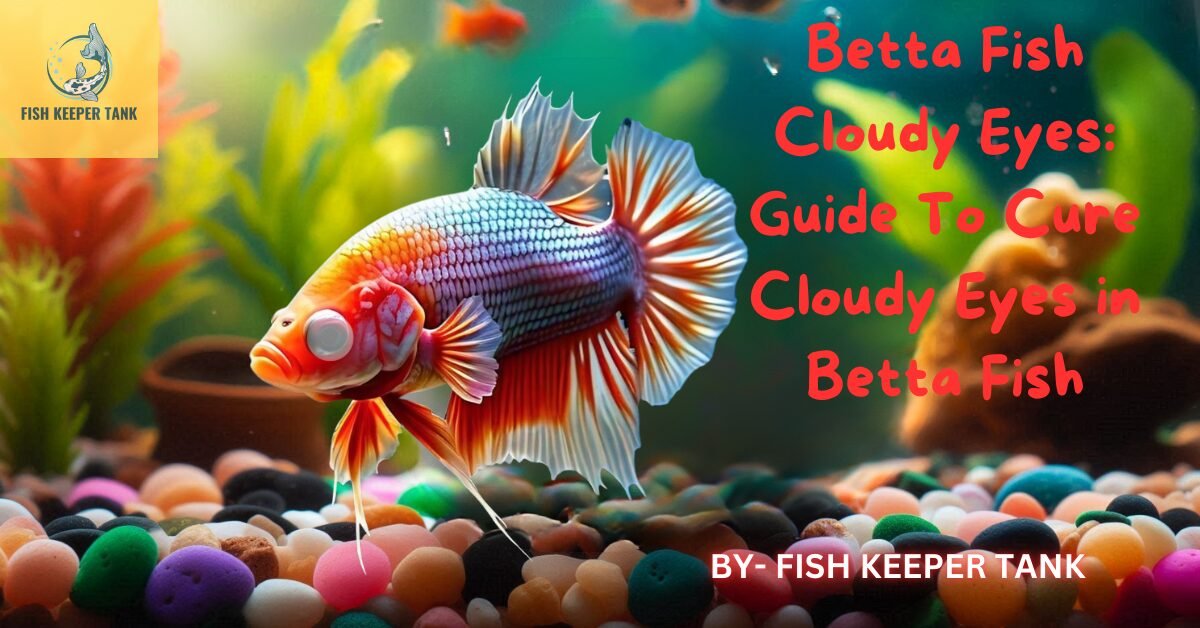Introduction
If you ever notice your Betta Fish or Sesame Fighting Fish sporting cloudy or white eyes, you might be concerned about their health. Betta Fish cloudy eyes can be a symptom of various underlying issues, and understanding these can help provide proper care. This guide, “Betta Fish Cloudy Eyes: Guide To Cure Cloudy Eyes in Betta Fish”, will dive into everything you need to know about Cloudy and White Eyes in Betta Fish.

Betta Fish Habitat
Creating a suitable habitat for your betta fish is essential to their well-being. In their natural habitat, Betta fish originate from Southeast Asia, where they thrive in shallow, warm waters like rice paddies, ponds, and slow-moving streams. It is ideal to mimic their natural habitat with appropriate water quality and temperature to maintain a stress-free, immunity-boosting environment and prevent diseases like cloudy eyes.
What Is Cloudy Eyes?
Cloudy eyes in betta fish refers to a condition where one or both eyes of a betta fish develop a hazy, milky, or opaque appearance. This condition can range from a light haze to a dense whiteness, indicating various health issues.
Betta Fish Cloudy Eyes is not a disease but a symptom underlying health issues such as infections, injuries, or environmental problems. Identifying cloudy eyes and showing prompt treatment is essential to prevent permanent damage or blindness in Betta Fish.
How Do Betta Fish’s Eyes Work?
Like other Fish, betta fish have specialized lateral eyes that enable them to see the underwater environment. Their eyes are adapted for detecting movement and distinguishing colors, which is optimal for interaction and survival.
Their eyes also work without eyelids, making them more vulnerable to environmental stresses and health issues if their habitat is improperly maintained.
Signs and Symptoms of Cloudy Eyes in Betta Fish
Recognizing the symptoms associated with cloudy eyes is crucial for timely intervention:
- Greyish or Opacity in the eyes: A noticeable greyish tint or film covering the eye represents the early stages of Cloudy Eyes in Betta Fish.
- Hazy or Cloudiness in the eyes: If Betta Fish’s eyes become foggy, hazy, or cloudy, they might affect their vision.
- Redness in the Eyes: Redness or bloodshot eyes that might signal inflammation, irritation, or injury.
- Inflammation in the eyes: Swollen, inflamed, or puffy areas around the eyes might also indicate inflammation, irritation, or injury.
- Swollen or Bulging eyes: These symptoms often signify more serious health conditions requiring immediate intervention.
- Discharge from the eyes: Any discharge, such as pus or other fluids, may indicate bacterial infections.
- Loss of appetite: A sick or ill betta fish may refuse to eat food because of loss of appetite.
- Lethargy: Lack of movement, inactivity, or sluggishness in betta fish could signal significant health problems.
- Distress and Erratic Swimming: Betta fish swimming in circles or erratic movement are the signs of distress that can indicate discomfort caused by Cloudy Eyes.
Other signs of Cloudy Eyes in Betta Fish include:
- White/cottony sores.
- Body colors turning white.
- Discolored fins.
- Brown gills.
- Frayed/ragged fins.
- Excess mucus on the skin.
- Swollen lips.
- Bleeding/inflamed fins.
Causes of Betta Fish Cloudy Eyes
Several factors may lead to Cloudy Eyes in Betta Fish. Understanding the root causes of Cloudy Eyes can help in proper treatment and prevention:
- Internal Parasites: Parasites can invade through contaminated water or food inside the betta fish body and may cause problems, including Cloudy Eyes.
- Cataracts: Cataracts can develop due to genetic factors, old age, or contamination that may lead to Cloudiness in the Betta Fish Eyes.
- Cancer: Cancer is a rare case in betta fish. However, if it occurs, it may affect their eyes, among other symptoms.
- Bacterial or Fungal Infection: Infections are common among betta fish due to contaminated water or food, and this often presents with Cloudy Eyes as a symptom.
- Viral Infection: These are less occurring, but viruses can severely impact their health and may lead to visible symptoms like Cloudy Eyes in Betta Fish.
- Injury: Injuries to the eyes caused by in-tank objects, decorations, fighting with incompatible tankmates, and other hazards can lead to infections manifesting in Betta Fish as Cloudy Eyes.
- Nutritional Deficiencies or Poor Diet: A poor diet lacking essential nutrients and insufficient protein will weaken betta fish’s overall health, including their eyes.
- Poor Water Quality: Poor or contaminated water in betta fish tanks is one of the leading causes of all health problems, including Cloudy Eyes.
- Overcrowding: An overcrowded tank may increase stress, aggression, and incompatibility between betta fish and tankmates, leading to fights and injuries.
- Popeye (Swollen Eye) Disease: Popeye is often caused by infections or physical damage that leads to swollen eyes but can also accompany Cloudy conditions in Betta Fish Eyes.
- Genetics: Some betta fish are more prone to eye issues due to genetic predispositions, which are outside our control.
Diagnosis of Cloudy Eyes In Betta Fish
Diagnosing Cloudy Eyes In Betta Fish involves examining and observing the betta fish tank closely, looking for signs and symptoms such as swollen eyes and haziness or fluid discharge.
Perform water quality and various other tests. For proper advice, consult a veterinarian or betta fish care expert.
Besides having Cloudy Eyes, sometimes Betta Fish also suffers from another condition called Dropsy.
Treatment Of Betta Fish Cloudy Eye
After diagnosis and identifying the cause, it’s time for the treatment of Betta Fish Cloudy Eyes with various methods:
Change The Water
Regular water changes in the betta fish tank will help improve the water quality and prevent the buildup of harmful substances that lead to Cloudy Eyes.
Quarantine The Betta Fish
If you want to prevent the spread of the disease to others, quarantine or keep the infected betta fish in a separate tank.
Change In Regular Diet
To strengthen your betta fish’s immunity, provide a well-balanced, high-quality diet rich in nutrients, proteins, and vitamins.
Change Betta Fish Tank Place
Sometimes, environmental factors impact betta fish health. If necessary, relocate your betta fish tank to a calmer and cleaner area.
Use Antibiotics
Antibiotics can be given to reduce bacterial infection. Always consult with a veterinarian to administer appropriate antibiotics.
Use Antifungal
Fungal treatments can help recuse the Cloudy Eye Condition in Betta Fish with an appropriate diagnosis.
Aquarium Salt
Adding aquarium salt is a natural remedy for reducing stress and treating mild infections, but it must be used cautiously.
Epsom Salt Bath
Epsom salt baths for Betta Fish Cloudy Eye may help relieve swelling and inflammation and aid in quick recovery.
Copper Sulfate
Copper sulfate can be effective for specific internal and external parasites.
Hydrogen Peroxide
It can help treat certain infections but can only be used under careful guidance.
Medicated Food
Specialized medicated food can be given to support your betta fish recovery from infections and deficiencies.
Consult a Veterinarian
The best way possible is always to consider expert advice to ensure accurate diagnosis and treatment.
Prevention Of Cloudy Eye In Betta Fish
- Closely observe your betta fish tank and look for any signs of infection.
- Quarantine the infected Fish in a separate tank.
- Perform regular water changes and monitor the water quality. Use a good quality filter if possible.
- Provide a well-balanced diet with high-quality food.
- Avoid using obstacles that can injure your betta fish.
- Use a spacious tank so that your betta fish can move freely.
- Avoid adding aggressive tankmates in your betta fish tank.
- Always consult an expert betta fish caretaker for health and medicine advice.
Is Cloudy Eyes A Fatal Disease?
Cloudy Eyes is not as fatal as other fish-related diseases. However, it is a severe condition that needs quick response and treatment to avoid worsening.
Is Cloudy Eyes Contagious?
Cloudy Eye condition in Betta Fish is not typically contagious. However, poor water quality or infections might affect other tankmates, so proper tank hygiene is essential.
Can All Fish Get Cloudy Eyes?
Yes, Cloudy Eyes can affect other fish species due to similar causes, such as infections, poor water quality, or injuries. However, each species might exhibit different symptoms and require other treatment approaches.
Cloudy Eyes vs Popeye (Swollen Eyes)
It’s essential to distinguish between Cloudy Eyes and Popeye. Both are considered eye abnormalities caused by infection, nutritional issues, or poor water conditions. However, there is a specific differentiation between them.
- Cloudy Eyes is a disease that swells the eyes and develops a cloudy opaque covering over the eye lens.
- Popeye is a disease that includes swelling or bulging of eyes but may not have hazy, cloudy, or opaque film coating over the eye lens.
Betta Fish Care Guide
- Ensure the tank is spacious for free movement and has plenty of shelter to rest.
- Monitor your betta fish tank and observe any signs of infection or injury.
- Maintain stable water quality with a temperature between 76°F and 82°F (24°C to 28°C) and a pH level between 6.5 and 7.5.
- Perform regular water changes as per your fish tank needs.
- Provide a well-balanced diet with high-quality food.
- Keep the tank clean and well-maintained. Use a filter for better cleaning.
- Mimic your betta fish natural habitat by providing proper hiding spots and plenty of plants.
- Ensure tank mates are compatible.
- Avoid sudden changes and provide a stress-free environment.
Conclusion
If your Betta Fish suffers from Cloudy Eyes, it is an alarming factor, but identifying symptoms early can lead to effective treatment. “Betta Fish Cloudy Eyes: Guide To Cure Cloudy Eyes in Betta Fish”, helps you to understand the causes and treatment options that can help ensure your betta fish’s long and healthy life. Monitoring your betta fish closely and taking appropriate actions can keep your aquatic friend healthy and vibrant. Consult a professional if you need more clarification about your Betta Fish’s health. Remember: “A Healthy Betta Is A Happy Betta.”
Frequently Asked Questions
What can cause cloudy eyes in betta fish?
Cloudy eyes can result from infections, injuries, poor water quality, or nutritional deficiencies.
Is cloudy eye serious?
It can indicate more serious underlying health issues; hence, prompt action is advised.
How do I treat my betta’s cloudy eyes?
Treatment may involve changing water, improving diet, and applying medications as necessary.
Can I prevent cloudy eyes in betta fish?
Yes, maintaining a clean habitat and providing proper nutrition are critical steps in prevention.
What is the difference between cloudy eyes and Popeye?
Cloudy eyes refer to Opacity in the eyes, while Popeye involves eye swelling, usually indicating a different issue.
People Also Read:

